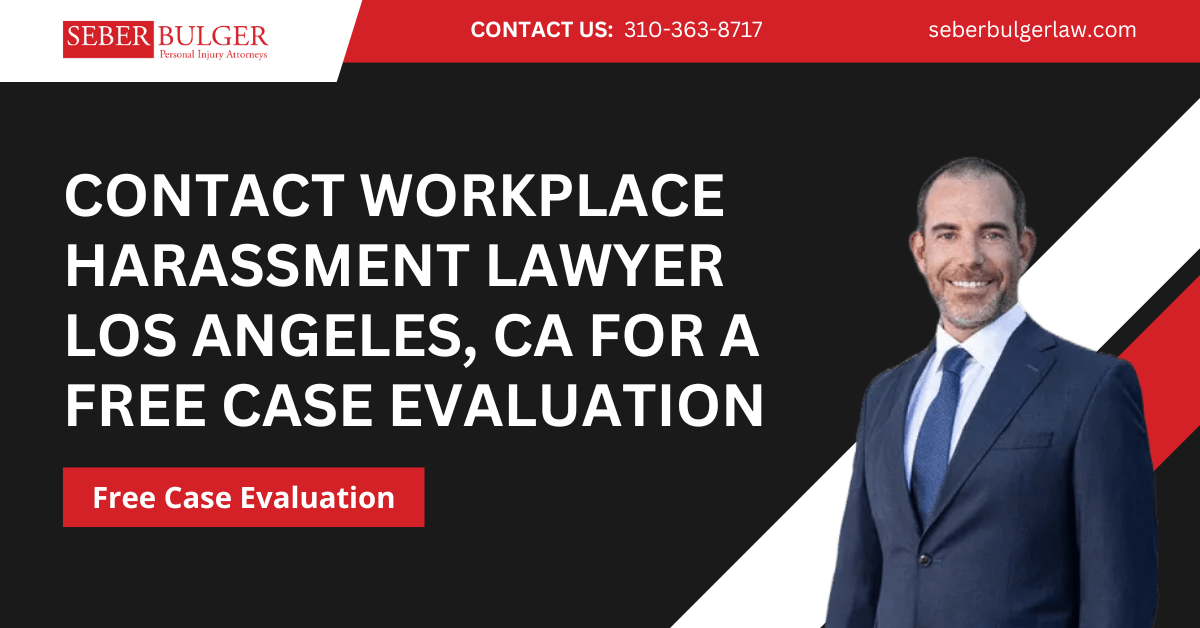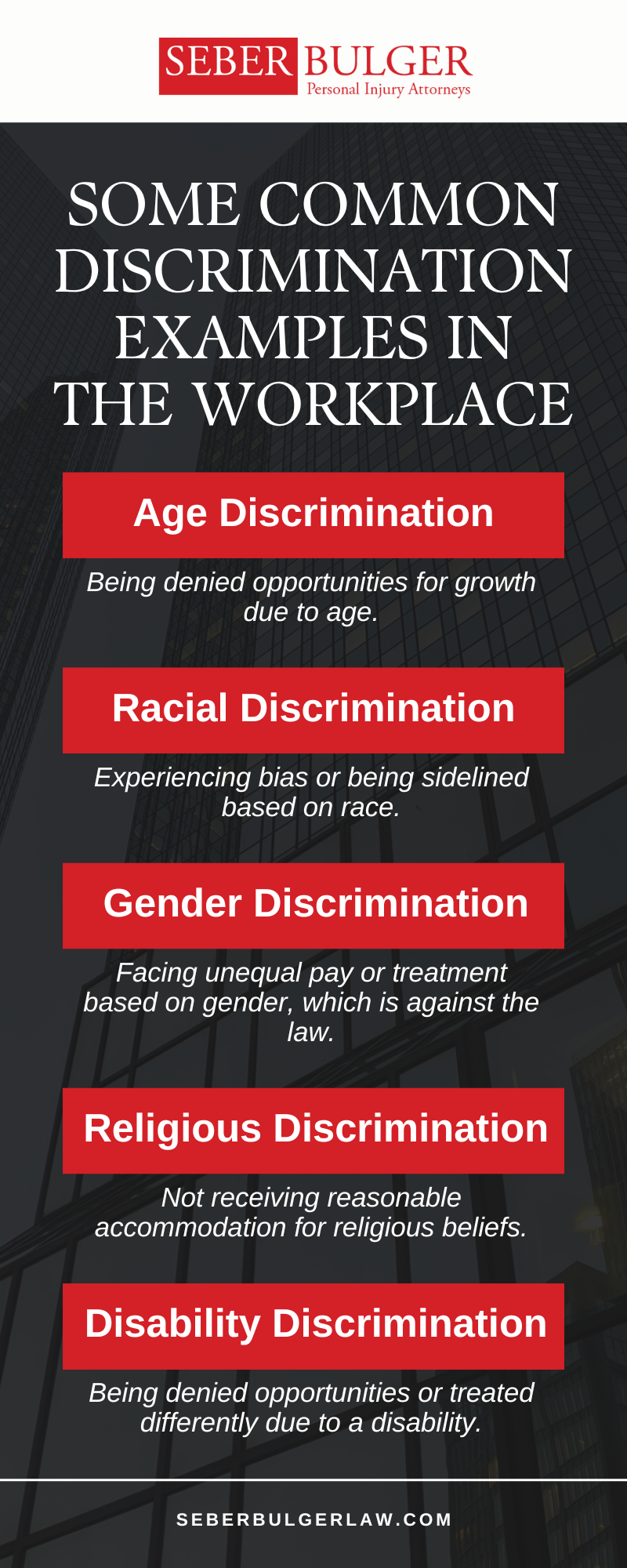Experienced Los Angeles Attorneys
Personal Injury
Employment Law
Los Angeles, CA Workplace Harassment Lawyer
Top Rated Attorneys
Your Dedicated Workplace Harassment Attorneys
Our trusted Los Angeles, CA workplace harassment lawyer knows that workplace harassment can come in many forms.
Often, the harasser can make victims feel as if they are being “too sensitive” or they are making too big of a deal out of a joke. However, workplace harassment should be taken seriously and if you have been experiencing workplace harassment or have told your employer that you are experiencing it and they are not protecting you, it is time to speak with our lawyer who can help.
No one should feel unsafe when they go to work. Whether you are experiencing this unwelcome behavior based on your religion, race, or gender, you have the right to work without being harassed. Call our experienced team at Seber Bulger Law when you need help after you have experienced workplace harassment. Your first consultation is free!

Common Examples Of Workplace Harassment
If someone else is harassing you at work, it means that they are creating an environment that is offensive and that can even end up making the place of employment feel hostile. It is also important to speak with our lawyer if you believe that the working environment they have created is so hostile that it is not possible to continue conducting your work there.
Harassment can come in many forms. This includes:
- Making offensive jokes about someone’s race or saying sexual slurs
- Threatening or intimidating someone
- Verbally or physically assaulting someone
- Posting pictures or placing objects around the office that are clearly offensive to one or more employees and that causes the victim to be unable to continue working as normal
- Ridiculing another employee
Determining Responsibility For Workplace Harassment
While it is on the harasser to stop harassing employees at the workplace, California law also states that the employer is legally liable for workplace harassment. This applies to employees who were harassed and suffered economic damages, such as losing wages, being denied a promotion, being denied a raise, or being wrongfully terminated. The employer is responsible for harassment from the supervisory level as well as from other employees.
Sexual Harassment In The Workplace
There are different forms of sexual harassment that a person may experience. This includes an employer attempting to manipulate an employee for sexual favors. The employer may state that if the employee does not perform these sexual favors then they will:
- Give the employee a poor performance review
- Threaten to terminate the employee
- Withhold a promotion that the employee deserves
- Withhold paying the employee or withhold vacation or sick hours
When you have worked in a place of employment and experienced harassment in any form, you may be scared to do something about it. You may feel so threatened that you feel you will be stuck in this position forever. However, it is vital to get legal help as quickly as possible to protect yourself and to protect others around you. When you are ready, reach out to Seber Bulger Law to speak with our trusted and compassionate Los Angeles attorney.
California Workplace Harassment Laws
Workers who are experiencing harassment can depend on our employment lawyers. Understanding the specific laws related to workplace harassment is important, not only for employees but also for employers who must foster a safe and respectful work environment.
California’s Anti-Harassment Laws
California is one of the states that has one of the strongest protections against workplace harassment, and they cover many different legal areas. Under the California Fair Employment and Housing Act (FEHA), employers are prohibited from engaging in harassment based on various protected characteristics, such as race, gender, sexual orientation, age, disability, religion, and more. This law extends protection to employees, contractors, and even job applicants. Workplace harassment can encompass various forms, including verbal abuse, offensive jokes, and unwelcome advances, and the FEHA provides victims with a legal recourse to address such behavior.
Sexual Harassment Laws
One of the most prevalent types of harassment is sexual harassment, which impacts many workers across numerous industries. California law explicitly defines and prohibits sexual harassment in the workplace. Employers are required to take proactive measures to prevent and address sexual harassment, including implementing anti-harassment policies, conducting training, and promptly investigating complaints. Our sexual harassment lawyer helps victims pursue legal action against their harassers and employers who fail to address the issue adequately.
Retaliation Protections
Our Los Angeles workplace harassment lawyer can explain how California laws also protect employees from retaliation in addition to harassment. Employees who come forward to report workplace harassment should not fear adverse consequences, as employers are prohibited from retaliating against them. This aspect of the law is essential to encourage employees to speak up and fosters a safer work environment.
Statute Of Limitations
Individuals who plan to file a workplace harassment claim should be aware of the statute of limitations, which is the time period where individuals are allowed to submit their claim. Under California law, employees typically have one year from the date of the harassment incident to file a complaint with the Department of Fair Employment and Housing (DFEH). However, this period may be extended in some circumstances. Consulting with our workplace harassment attorney promptly can help individuals determine the appropriate course of action and ensure they meet all legal deadlines.
Types Of Workplace Harassment
Our LA harassment lawyer understands the importance of maintaining a safe work environment for all employees. Unfortunately, workplace harassment continues to be a prevalent issue that affects individuals across various industries. Identifying the signs of harassment is vital for fostering a respectful workplace culture. We will explore four clear signs of workplace harassment that should never be ignored.
Verbal Abuse And Offensive Language
Inappropriate verbal abuse and offensive language are some signs of workplace harassment. This includes derogatory comments, racial slurs, sexist or homophobic remarks, and inappropriate jokes. Such behavior creates a hostile work environment and can deeply affect the victim’s self-esteem and mental health. Employers must take immediate action if they witness or receive reports of employees engaging in verbal abuse or using offensive language.
Persistent And Unwanted Advances
Unwanted advances, both physical and verbal, are clear indications of harassment. It is essential to distinguish between consensual interactions and unwelcome advances. If an individual consistently makes unwanted romantic or sexual advances towards a colleague, disregarding their discomfort or rejection, it is a form of harassment. Employees should never feel pressured, intimidated, or coerced into any form of intimate relationship at the workplace. Organizations must have strong policies in place to prevent and address such behavior. It is the responsibility of organizations to set strong policies to address and prevent instances of unwanted behavior.
Discrimination And Prejudice
Discrimination based on protected characteristics such as gender, race, age, religion, or disability is a serious form of workplace harassment. Employees may experience prejudice when it comes to promotions, assignments, salary, or access to resources due to factors unrelated to their skills or qualifications. It is essential for employers to create an inclusive and equitable environment, where individuals are judged solely on their abilities and contributions. As our workplace harassment attorney can tell you, if you notice signs of discrimination, do not wait to report them as soon as possible.
Intimidation, Threats, And Bullying
A toxic and uncomfortable work environment can be created through intimidating gestures, language and bullying. This can manifest through physical actions, aggressive gestures, constant humiliation, or the spreading of false rumors. Harassers may attempt to undermine their targets’ confidence, isolate them from their colleagues, or sabotage their work. Employers must foster a culture of respect and support, so that employees feel safe to report such behavior without fear of retaliation. Implementing anti-bullying policies and conducting thorough investigations into reported incidents are critical steps towards eradicating workplace harassment.
Los Angeles Workplace Harassment Infographic
Los Angeles Workplace Harassment Statistics
While there are several different types of workplace harassment, sexual harassment is one of the most prevalent. According to the U.S. Equal Employment Opportunity Commission (EEOC), there are approximately 7,000 sexual harassment in the workplace complaints filed each year. The majority of those complaints – about 80 percent – are filed by women.
If you are a victim of workplace sexual harassment, call our office to speak with one of our employment law attorneys and find out what legal recourse you may have.
Workplace Harassment FAQs
It’s essential to understand your rights, the steps to take, and the support available to you. Let’s address some more common questions about workplace harassment. Empower yourself with knowledge, and let Seber Bulger Law help you find a path to resolution and justice.
Can I Sue My Employer For Workplace Harassment?
Yes, you can sue your employer for workplace harassment if they have failed to address the issue adequately. An attorney from our team might be able to help you recover the following types of compensation: back pay for lost wages, front pay for future lost wages, emotional distress damages, punitive damages if the harassment was severe and intentional, and attorney’s fees and legal costs.
What Constitutes Workplace Discrimination?
Workplace discrimination occurs when an employer treats employees unfairly based on certain characteristics, such as age, race, gender, religion, or disability. It can lead to a toxic work environment, in which employees may face belittlement, bullying, or exclusion solely because of their identity.
Discrimination adversely affects productivity, job satisfaction, and overall well-being, so it’s important to address and combat such behavior.
Discrimination in the workplace can take various forms. It may come from management, colleagues, or even clients. Some common examples include:
- Age Discrimination: Being denied opportunities for growth due to age.
- Racial Discrimination: Experiencing bias or being sidelined based on race.
- Gender Discrimination: Facing unequal pay or treatment based on gender, which is against the law.
- Religious Discrimination: Not receiving reasonable accommodation for religious beliefs.
- Disability Discrimination: Being denied opportunities or treated differently due to a disability.
How Can Employees Fight Back Against Workplace Discrimination?
If you’ve experienced workplace discrimination, remember that you have the right to fight back and seek compensation. Before contacting our employment lawyer, educate yourself about the different types of workplace discrimination and your rights as an employee. Our experienced lawyer can provide valuable guidance and support throughout the process, helping you understand your options and seek justice.
What Are Some Potential Items of Evidence In A Workplace Harassment Case?
Evidence in the workplace can include written communications (emails, text messages, notes), witness statements, video or audio recordings, performance evaluations, medical records (if the harassment caused physical or emotional distress), and more.
What Steps Should Take if I Am A Victim Of Workplace Harassment?
If you believe you’re a victim of workplace harassment, it’s essential to take action promptly. Some of these steps you may need to undertake are:
- Documenting Incidents: Keep a detailed record of any incidents, including dates, times, locations, and individuals involved.
- Reporting To HR: Notify your company’s human resources department about the harassment, following your company’s policies and procedures.
- Consulting Legal Counsel: Reach out to our workplace harassment lawyer at Seber Bulger Law to discuss your situation and explore potential legal actions.
Workplace Harassment Glossary
At Seber Bulger Law, we represent employees who are facing challenging work environments caused by unlawful treatment. As your Los Angeles, CA workplace harassment lawyer, we are dedicated to helping individuals hold employers accountable when they allow or contribute to workplace harassment. Below are key legal terms and phrases you may come across as you learn more about your rights and legal options.
Hostile Work Environment
A hostile work environment exists when workplace harassment becomes so severe or persistent that it alters the conditions of employment. In California, this can include ongoing offensive jokes, inappropriate comments, or any conduct that interferes with an employee’s ability to perform their job. What qualifies is not just based on the intent of the harasser but also on how the behavior is received. For example, if repeated verbal abuse makes it hard for someone to focus on their job, that can support a claim. A hostile environment doesn’t require physical contact—verbal actions alone can meet the threshold if they’re frequent or intense enough. We look at the total situation, including how long the conduct has occurred, its frequency, and the power dynamics involved.
Quid Pro Quo Harassment
Quid pro quo is a Latin phrase meaning “this for that,” and in employment law, it refers to a type of sexual harassment where job benefits are offered in exchange for sexual favors. This could include promotions, raises, or favorable treatment being made conditional on complying with inappropriate requests. For example, if a supervisor implies that an employee will lose their job or be denied a raise unless they go on a date, that may form the basis for a quid pro quo claim. This type of harassment typically involves a person in a position of authority over the victim. Even one incident can be enough to support legal action, unlike hostile work environment claims, which usually require a pattern of behavior.
Retaliation
Retaliation occurs when an employer punishes an employee for engaging in a legally protected activity, such as reporting harassment. Retaliation can take many forms—termination, demotion, changes to work hours, or being passed over for opportunities. California law makes it unlawful for employers to retaliate against workers who file complaints or participate in an investigation related to harassment. Even if the original harassment claim is not proven, the retaliation itself may still be illegal. We advise clients to document any disciplinary action or changes to their job duties after filing a complaint to support a potential retaliation claim.
Protected Characteristics
California’s Fair Employment and Housing Act (FEHA) prohibits harassment based on specific protected characteristics. These include race, gender, age, sexual orientation, religion, disability, national origin, and others. Harassment linked to any of these factors may be illegal, even if it seems subtle or happens outside of work hours. For example, comments made about someone’s religious attire or age-related jokes can create a basis for a legal claim. It’s important to know that these protections apply not only to full-time employees but also to part-time workers, interns, independent contractors, and applicants. Identifying when conduct is related to a protected characteristic is a critical part of evaluating a case.
Constructive Discharge
Constructive discharge occurs when an employee resigns due to intolerable working conditions caused by harassment. In these cases, the resignation is not truly voluntary—it happens because the employer made the environment unlivable. Courts treat this as a form of wrongful termination. To pursue a constructive discharge claim, we must show that any reasonable person in the same situation would have felt forced to quit. If the harassment was reported and the employer failed to take action, that adds weight to the claim. Clients who leave their jobs due to severe harassment should keep records of what led to their decision.
If you’ve been affected by workplace harassment, we’re here to help. Contact Seber Bulger Law today for a free consultation to discuss your legal options and take the first step toward a better work environment.
Schedule Your Free Consultation Today
Creating a safe space for reporting incidents and facilitating prompt and effective investigations are essential steps towards combating workplace harassment. By addressing these signs head-on, we can foster an environment where every individual feels respected, valued, and free from harassment. For more information about legal services, contact our experienced Los Angeles workplace harassment at Seber Bulger Law now.
Client Review
"Jonathan is a smart and capable attorney, who is attentive and very personable. I would recommend the firm Seber Bulger to anyone seeking high quality legal services and a great level of professionalism." Cristina Lombardi
Personal Injury Practice Areas
Client Review
Hello Self!
- Locations Served
- Beverly Hills
- West Hollywood
- Santa Monica
- Venice
- Silver Lake
- Culver City
- Greater Los Angeles
- Inglewood



